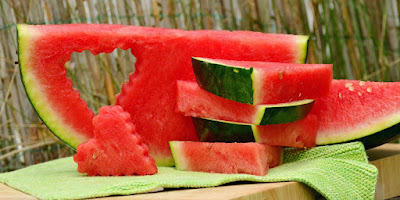Cool Down with Watermelon
Savoring Summer
As the sweltering summer heat descends, there’s nothing quite like biting into a juicy slice of watermelon. This quintessential summer fruit not only refreshes and hydrates but also offers a host of health benefits. Let's dive into the science behind why watermelons are the perfect summer treat and explore some fun facts that make them even more enjoyable.
The Joy and Science of Eating Watermelon
The Why of Watermelon’s Refreshing Appeal??
1. Hydration Hero: Watermelon is composed of about 92% water, making it an excellent choice for staying hydrated during hot summer days. Proper hydration is crucial for maintaining body temperature, supporting metabolism, and ensuring overall health.
2. Nutrient Powerhouse: Despite its high water content, watermelon is packed with essential vitamins and minerals. It is an excellent source of vitamins A and C, which are vital for skin health and immune function. It also contains potassium, which helps regulate blood pressure, and magnesium, which supports muscle and nerve function.
3. Lycopene Love: Watermelon is rich in lycopene, a powerful antioxidant responsible for its red hue. Lycopene has been linked to reduced risks of certain cancers, improved heart health, and protection against sunburn. Interestingly, watermelon contains more lycopene than raw tomatoes, making it a superior source of this beneficial compound.
4. Amino Acid Goodness: Citrulline, an amino acid found in watermelon, plays a role in improving blood flow and reducing muscle soreness. Athletes often consume watermelon or its juice to aid in post-workout recovery.
Fun Facts to Sweeten Your Watermelon Experience
1. Seedless Wonders: While traditional watermelons are full of seeds, modern agricultural techniques have produced seedless varieties that are even more convenient to eat. These varieties are created by crossing watermelons with different chromosome numbers, resulting in fruits that can't produce mature seeds.
2. A Fruit or a Veggie? Botanically speaking, watermelon is a fruit because it develops from the flower of the plant and contains seeds. However, it belongs to the Cucurbitaceae family, making it a close relative of cucumbers, pumpkins, and squash, which are often considered vegetables.
3. Watermelon Festivals: Many regions celebrate the arrival of watermelon season with festivals. These events often feature watermelon eating contests, seed-spitting competitions, and even watermelon-themed parades. Such festivals highlight the fruit's cultural significance and its role in bringing communities together.
4. Sweet Versatility: While watermelon is delicious on its own, it can also be incorporated into various dishes. From refreshing salads and smoothies to tangy sorbets and grilled slices, the culinary possibilities are endless. Watermelon’s sweet and mild flavor pairs well with both savory and sweet ingredients, making it a versatile addition to summer menus.
Tips for Picking the Perfect Watermelon
Choosing a ripe watermelon can sometimes be a challenge. Here are a few tips to help you select the best one:
- Look for Uniform Shape: Irregular shapes can indicate uneven growth, which may affect the flavor.
- Check the Field Spot: A creamy yellow spot on the underside of the watermelon indicates that it ripened in the sun, leading to a sweeter flavor.
- Tap Test: A ripe watermelon should produce a deep, hollow sound when tapped.
- Heft It: Watermelons are mostly water, so a heavier watermelon is likely to be juicier.
Conclusion
Eating watermelon in the summer is more than just a refreshing treat; it’s a celebration of one of nature’s most hydrating and nutrient-rich gifts. Understanding the science behind its benefits enhances our appreciation for this beloved fruit, while fun facts and tips add to the joy of savoring each bite. So, next time the temperature rises, reach for a slice of watermelon and relish the delicious, health-boosting experience it offers.
Happy summer and happy munching!

No comments:
Post a Comment